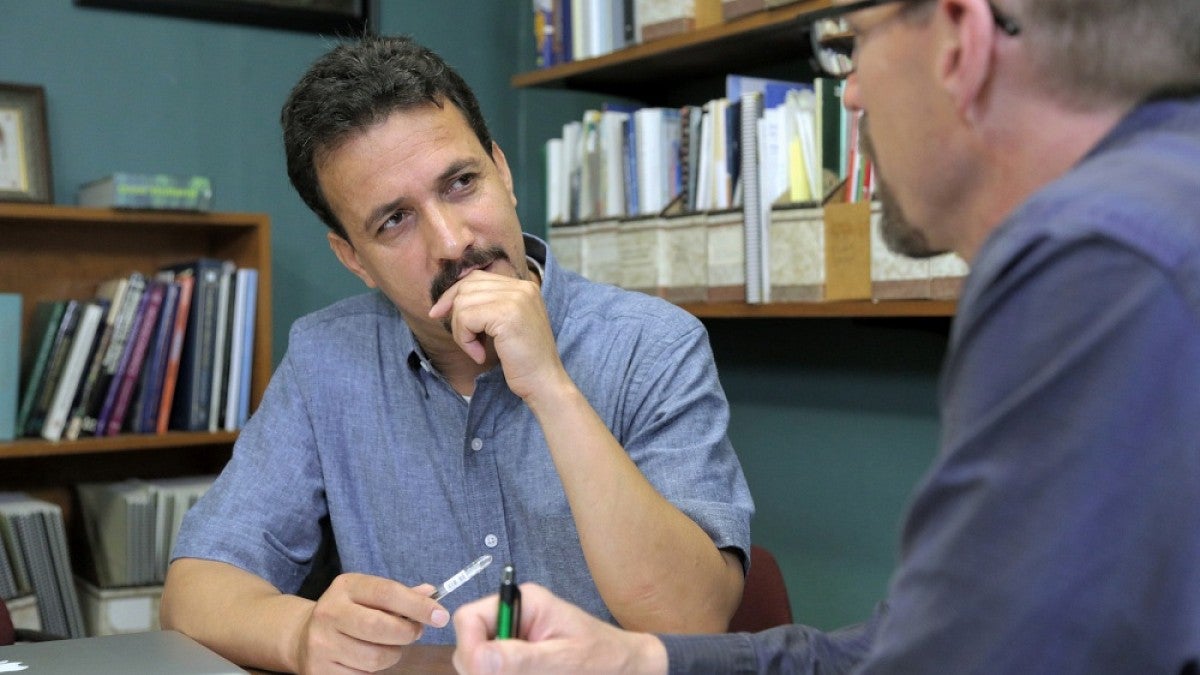UO professor Richard Margerum has spent years analyzing collaborative planning and management involving environmental and land-use issues, expertise he’s now sharing with new colleagues on the other side of the world as one participant in an ongoing international partnership.
Recently, Margerum has been helping professor Zafar Khan examine the effect of different approaches to community-based natural resources management in Pakistan — a country half a world away but with regions very similar to Oregon. Khan is a professor in the Department of Environmental Sciences at Karakoram International University in Gilgit, Pakistan.
The collaborative research between Khan and Margerum, head of the Department of Planning, Public Policy and Management in the UO’s School of Architecture and Allied Arts, is part of the UO-KIU Partnership, a three-year initiative that began in September 2013. The goal of the joint venture is to help KIU advance its work in environmental studies and business management — especially local entrepreneurial and sustainable development — and boost faculty professional development.
“Professor Khan has some terrific data that have been collected by his team in two communities, and I think there are some interesting governance findings that offer lessons to an international audience,” Margerum said.
Khan’s research looks at the environmental impact of climate change on large vertebrate animals, especially in mountain regions near glaciers. He also helps communities develop tools to mitigate the effect of climate change in Gilgit.
Khan said the partnership with the UO has helped raise the profile of faculty research at his institution and improve classroom effectiveness. He said he’s anxious to apply what he’s learned back home.
"I believe the program is well-designed to cater for the needs of Pakistani researchers and teaching faculty,” Khan said. “In the field, I witnessed how students are involved in action research and other experiential learning activities. I am eager to replicate such a field program in my university.”
The partnership allows faculty exchanges each year, pairing visiting KIU faculty with UO mentors and sending UO experts to work on projects in Gilgit. Twenty KIU faculty have visited Eugene, and several others are taking part through other programs.
Eight UO faculty have ventured to Gilgit over the grant period, all accompanied by UO international studies professor Anita Weiss, whose research focuses on Pakistan and who is fluent in the national language, Urdu. Weiss also is the faculty co-lead on the UO-KIU Partnership.
“The most recent UO faculty trip to Gilgit focused on developing the KIU Faculty Professional Development Centre to promote effective teaching and learning about interactive teaching styles,” Weiss said.
Each visiting KIU faculty member is invited by a mentor to audit UO classes, which gives them exposure not only to topics in their research field but also to teaching styles and class structure.
Khan is part of a cohort with three other colleagues who meet at least once a week with their respective mentors. All receive training through UO’s Teaching Effectiveness Program and American English Institute programs, and faculty in those programs have visited Pakistan.
“I’ve had the opportunity to travel to Pakistan to participate in creating a center for faculty professional development,” said Trish Pashby, a senior instructor at the AEI. “These trips to their beautiful city and campus have been amazing, life-changing adventures.”
The UO-KIU Partnership was made possible by a $1 million public diplomacy grant to the UO from the U.S. Department of State. The grant led to a three-year cooperative agreement and academic partnership with KIU.
The grant is due to expire in December, but the strong performance of the partnership and its projects has motivated key officials to seek an extension.
“The partnership with Karakoram International University epitomizes the commitment of the Center for Asian and Pacific Studies to international relationship building,” said Jeff Hanes, director of the center and an associate professor of history. “The grant has enabled us to build an educational bridge to Pakistan that only promises to grow stronger in the coming years.”
Weiss and Hanes are the principal investigators on the grant.
—By Chakris Kussalanant, University Communications


